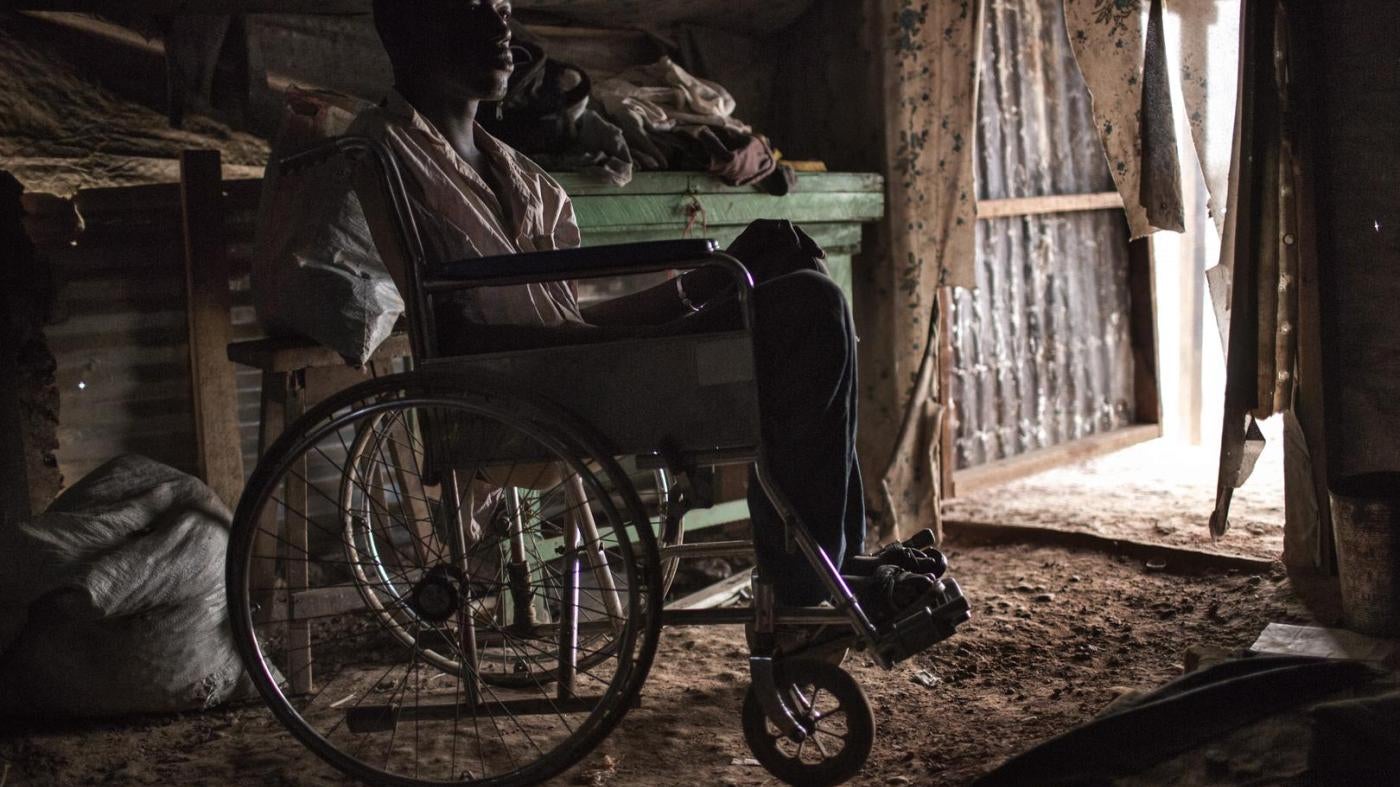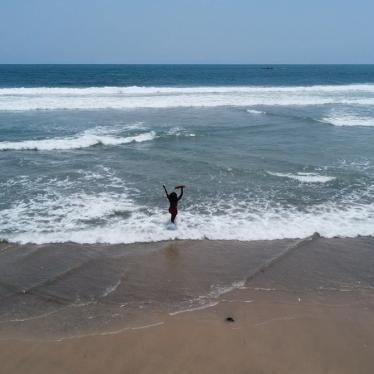It was about two o’clock in the afternoon, on a warm December day in 2013, when the sound of gunshots and frantic shouting abruptly woke Ambroise Andet from his midday nap. Startled, the 27-year-old propped himself up where he had been sleeping and looked around for his wheelchair. It wasn’t there.
Andet, who has been paralyzed from the waist down since the age of 14, began to panic.
Earlier that year, an alliance of mostly Muslim rebels called the Seleka had started to fight its way from the northern part of the Central African Republic toward Andet’s hometown, Bangui, the capital, in the southeast. Widespread killings of civilians, looting and burning of whole villages had marked the Seleka’s campaign to seize power and gain control over the country.
In response, groups calling themselves the anti-balaka had organized against the Seleka, and, in particular, through 2014 committed large-scale reprisal attacks against the country’s Muslim population. The bloody conflict has forced hundreds of thousands of people to flee the country. People with disabilities like Andet were particularly vulnerable during theses attacks by both Seleka and anti-balaka.
By early December, word had spread that a Seleka unit had begun to raid quarters in Andet’s neighborhood in the 5th district of Bangui. The attacks were usually sudden and lethal. Driving up in their 4x4 trucks, the Seleka would attack and often kill everybody who couldn’t flee. Nobody was spared, not even people like Andet who were unable to escape because of their disabilities. On December 9, the rebels finally reached the neighborhood where Andet lived with his parents and siblings. “It all happened really suddenly,” he recalled. “We never thought it possible that the Seleka would reach our home.”
When the attack came that day, Andet was abandoned by his family and community. He ultimately made it to the M’Poko refugee camp. But life in the camps for Andet and others with disabilities is especially difficult. Accessing basic necessities like food, toilets and medical care inside the camp is a challenge, as Human Rights Watch research shows.
Andet’s is one of many untold stories of the conflict that began in early 2013 and that resulted in the killing of thousands of civilians and the displacement of large parts of the population. Left behind were those who would have needed assistance to flee. In two Bangui neighborhoods alone, at least 57 people with disabilities were found to have shared Andet’s fate of abandonment, isolation and neglect. The actual number is probably much higher.
Realizing he had been left trapped and without means to flee, Andet screamed for help, he told the Human Rights Watch researcher Kriti Sharma. His screams went unheeded. With enormous effort, he crawled on the floor, hauled himself to the door of his parents’ house and looked out. The usually bustling street seemed eerie and deserted. Hastily packed suitcases stood forlorn on the neighbors’ verandas. Apart from roosters and dogs, not a soul was around. The entire neighborhood had fled, and so had his parents. His wheelchair was gone, too. He never found out what happened to it.
“I started to shout, thinking I was dreaming,” Andet told Sharma. “I shouted and shouted, but there was no one. No one came to help.”
Andet spoke about his ordeal without visible emotion. He is a tall, confident young man, who speaks French and never lost his composure while recalling the events that followed the fateful day of his abandonment. A year after the attack, he shared his story eagerly and without bitterness. Leaning forward in the slightly battered wheelchair a good Samaritan bought for him, he held his listeners’ gaze. Only when recalling moments of severe anguish did his darting eyes reveal some of the distress he must have felt at the realization that the very people who gave him life left him behind to die.
Andet owes his survival to a youngster half his size. Desperate, yet unable to move, he had collapsed on his parents’ doorstep and remained there for the rest of the day and the entire night, oscillating between despair and fear. As the sun rose again, he spotted “the kid.” He knew the kid was his one and only chance. Yet the young boy was as scared of him as Andet was of being left to die. “Please kid, help me! If you leave me … I will die,” Andet told him. He had to put all his energy into his tearful passionate pleading, before the youngster caved in, picked Andet up and heaved him on his back.
It was a strenuous 2-to-3 kilometer walk to the camp, which was near the airport. Seleka were still roaming around; shots rang out, not far away. They had to hide along the way and stop many times, exhausted and terrified. “We were breathless when we arrived,” Andet remembered. “Without any cart or wheelchair” a young stranger had accomplished what his next of kin had failed to do: “Thanks to that kid,” he said. “I stayed alive.”
Yet for people with disabilities like him, life is hard to navigate at M’Poko, where, among the apocalyptic looking carcasses of abandoned airplanes, thousands of internally displaced people have taken refuge in makeshift shelters. The terrain is bumpy and uneven; the air filled with dust, whirled up by playing children and even the slightest gust of wind. Open drains intercept the paths between the tents and, imperceptible for those who can see and jump, demarcate a rather limited zone of free movement for those who can’t.
Andet now calls a tent his home. Its tarp lets hardly any light through but has so many holes that when it rains its inhabitants get drenched. When food distributions used to take place in the M’Poko camp, the distribution site was inaccessible for him and people like him would get pushed aside. Sometimes he goes without food all day, he said. “Even to get soap to wash our clothes is not easy. You see how dirty I am from my pants to my feet?”
When Andet, at the age of 14, almost died from cerebral malaria and, resuscitated from a coma, woke up without any feeling in or control over his legs, he knew his life had changed forever. Although there was never a lot of support for people with disabilities he had managed to carve out his niche and gained a certain amount of independence by repairing mobile phones for a small fee. At camp, however, life is a daily struggle for survival and dignity. To accomplish even the most basic necessities, such as visits to the toilet, he needs help. And if he cannot find anybody to push him there, he has to stay put, as he cannot negotiate the uneven terrain by himself.
To be this dependent on others’ goodwill is something Andet finds hard to accept. But what he finds hardest to come to terms with is his parents’ desertion. “The war had just started, you ran away, you knew I didn’t have feet!” he told them when he found them at M’Poko. “And you abandoned me here! If the situations were reversed, I would never have left you behind, I would have preferred to die with you.” Even though he has since tried to understand their predicament, the trauma of having been left behind continues to haunt him and remind him of his own vulnerability.
Having yet again been given another chance at life, however, Andet is determined to move on, which is why he wants his story to be known, and the plight of others in similar positions to be recognized. “We, people with disabilities, we have always been abandoned,” he said. “So if there are people who can support us, please, come support us.”





